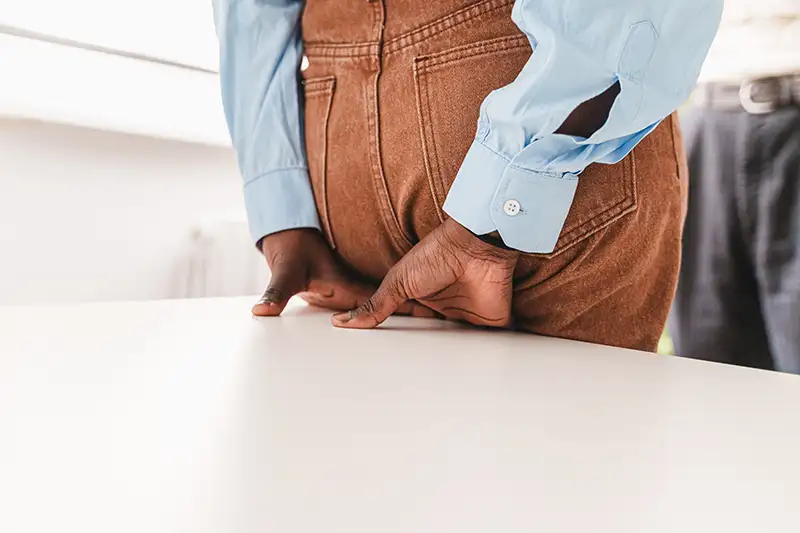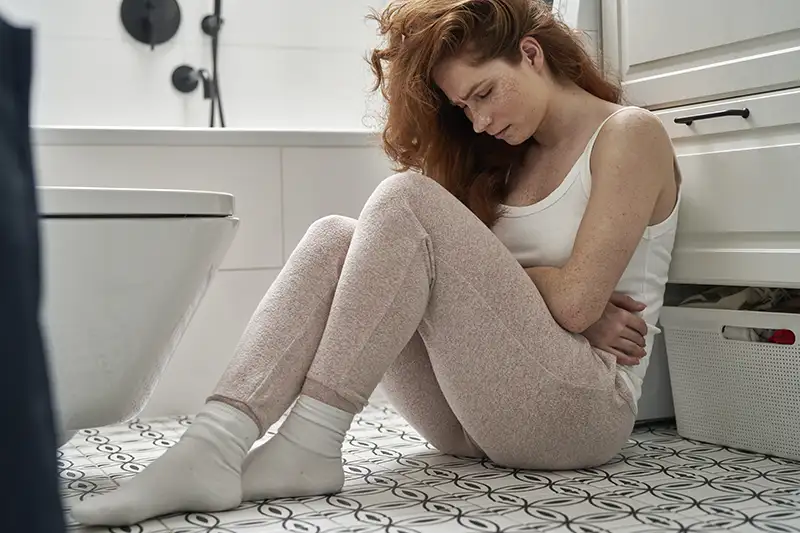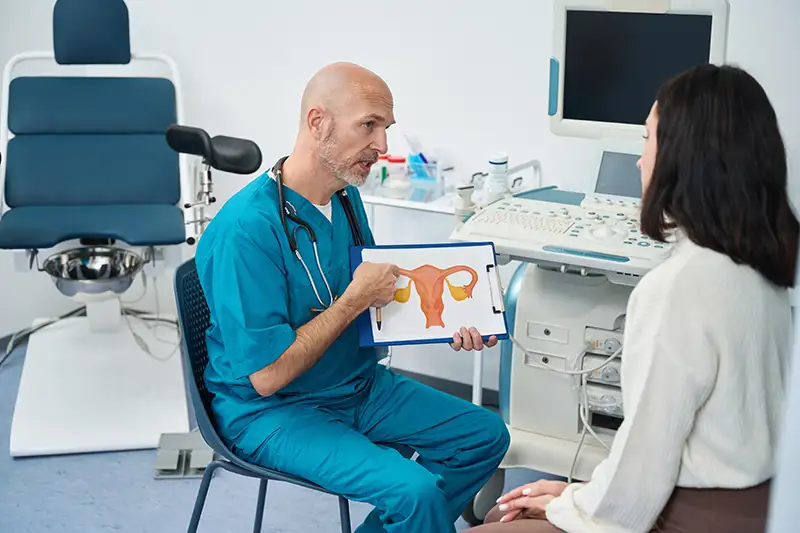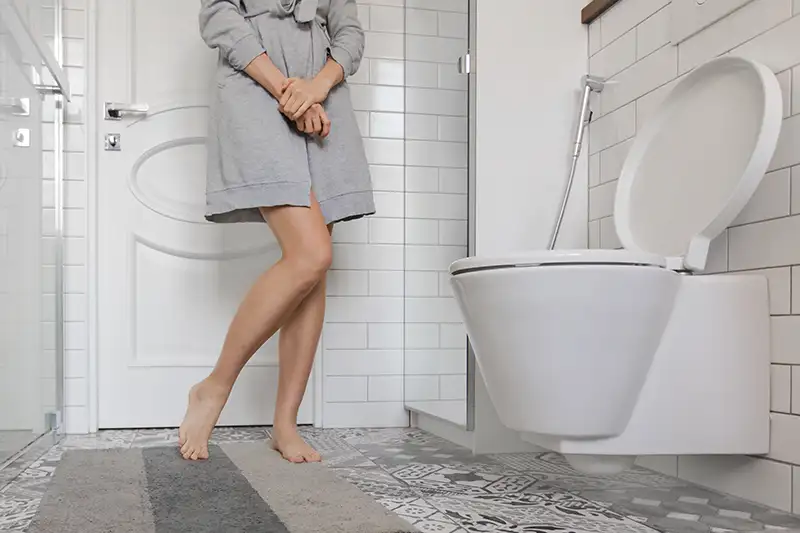What is Fecal Incontinence?
Fecal incontinence, also known as bowel incontinence, happens when a person loses control over their bowel movements. Which can result in unintentional leaks or accidents, making it difficult to go about your daily activities and live a normal life. Bowel Incontinence can have a significant impact on a person’s life, often leading to feelings of embarrassment and shame. Because of this, many people with fecal incontinence may choose to isolate themselves from social activities to avoid the potential discomfort or awkwardness of dealing with accidents in public. This self-isolation can further affect their emotional well-being and quality of life, as they may avoid social interactions and activities they once enjoyed.

What Causes Fecal Incontinence?
There are several reasons why fecal incontinence might happen. It can be triggered by constipation, diarrhea, or large hemorrhoids, but the good news is these can often be treated with medication.
Other causes include damage to the muscles or nerves in the rectum, which can occur from childbirth, aging, or surgery. Chronic illnesses like irritable bowel syndrome, diabetes, stroke, spina bifida, digestive tract disorder, tumors, or rectal prolapse can also lead to fecal incontinence.
If you’re experiencing any of these issues, it’s important to consult a medical professional, such as those at the Incontinence Centers of America. Getting a proper diagnosis and treatment as soon as possible can help prevent fecal incontinence from worsening.
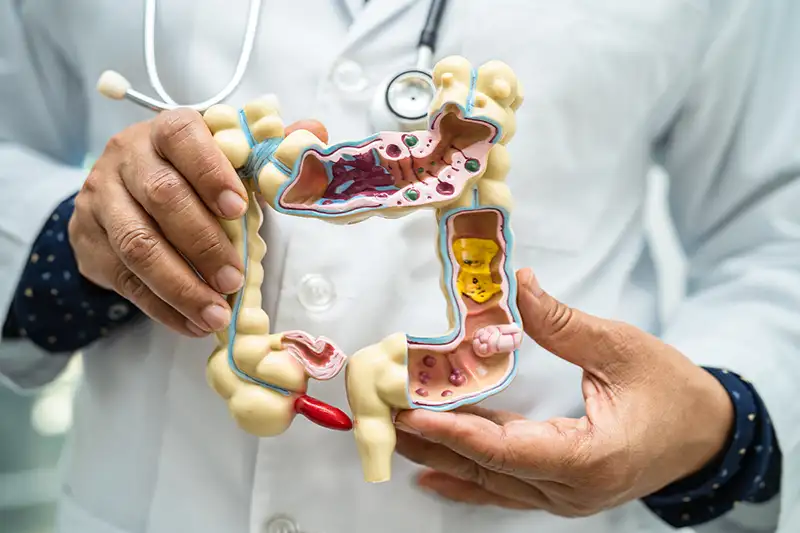
How Incontinence Centers of America Personalizes Care
At Incontinence Centers of America, every patient receives a thorough evaluation, including anorectal manometry, physical examination, and review of stool consistency and rectal sensation. This allows our specialists to create individualized treatment plans that may combine Axonics Therapy with behavioral therapy, medications, and pelvic floor rehabilitation.
Our team emphasizes patient education and ongoing support, ensuring you understand how your treatment works and what steps you can take to maintain improvements over time. This personalized approach has helped countless patients in Denver and Colorado Springs regain confidence and independence.
What Are The Symptoms Of Fecal Incontinence?
The most common symptoms of fecal incontinence are ultimately unintentional leaks or accidents. But what many people don’t know is that there are 3 different types of fecal incontinence that cause different symptoms.
- Urge incontinence: A sudden, uncontrollable urge to have a bowel movement that may prevent you from reaching the toilet in time.
- Passive incontinence: Passing stool or mucus without realizing it because you can’t sense that your rectum is full.
- Soiling: Streaks or stains of stool or mucus on your underwear.
Bowel incontinence most commonly affects women over the age of 65 years old, but it can happen to anyone, regardless of age or gender and it can really affect your quality of life.
What Treatment Options Are Available For Fecal Incontinence?
At Incontinence Centers of America, we provide a variety of treatments for fecal incontinence. One of our latest options is Axonics Therapy, which targets the nerves and muscles involved in bowel control. This therapy has been effective in increasing control of bowel movements and helping patients regain confidence and independence.
Supporting Lifestyle Approaches to Complement Treatment
While advanced therapies like Axonics can significantly improve fecal incontinence, combining medical treatment with lifestyle strategies can enhance outcomes:
- Bowel training to regulate timing and consistency of bowel movements
- Pelvic floor exercises to strengthen anal sphincter muscles and pelvic muscles
- Maintaining healthy bowel habits, including avoiding constipation and limiting spicy foods
- Physical activity to improve muscle tone and overall digestive function
These approaches are especially helpful for patients in Denver and Colorado Springs who want to actively participate in managing their condition.
Advanced Sacral Nerve Therapy in Denver and Colorado Springs
For patients seeking long-term solutions beyond medications and behavioral therapy, Axonics Therapy offers a minimally invasive option to improve fecal incontinence. This therapy targets the sacral nerves, which control the anal sphincter and pelvic floor muscles, restoring communication between the brain and the digestive system. Patients often experience stronger muscle contractions, improved rectal sensation, and better control over passing stool.
Axonics Therapy is performed on an outpatient basis and is suitable for patients with various causes of fecal incontinence, including nerve damage, muscle weakness, or altered bowel habits. The therapy is designed to last for years, giving patients reliable results and peace of mind.
Backed by clinical studies, Axonics® therapy is designed to help restore normal communication between your brain and your bladder or your brain and your bowel. Thanks to Axonics®:
- 93% of patients achieved clinically significant improvements after 2 years
- 94% of patients were satisfied with the Axonics® therapy
- Less than 2% felt any discomfort from the implant
1. Pezzella A, McCrery R, Lane F, et al. Two-year outcomes of the ARTISAN-SNM study for the treatment of urinary urgency incontinence using the Axonics rechargeable sacral neuromodulation system. Neurourol Urodyn. 2021;40(2):714-721. doi:10.1002/nau.24615
2. Blok, B, et al. Neurourol Urodyn. 2020
In addition to Axonics Therapy, we offer traditional treatments such as behavioral therapy and medications. Our team will work with you to create a personalized treatment plan that fits your specific needs and goals, aiming to help you take back control of your life.

